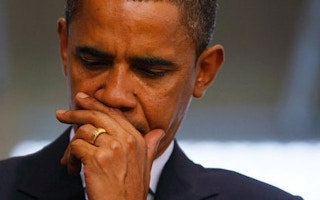President Barack Obama has final say on whether a Chinese-owned company can build wind farms near a US Navy installation in Oregon, a government lawyer told a federal judge in Washington.
The statement by Justice Department lawyer Joel McElvain came yesterday at a hearing before US District Judge Amy Berman Jackson, who is overseeing a lawsuit brought by Ralls Corp that seeks to block a ruling of a Treasury-led national security panel. The Committee on Foreign Investment in the US, or CFIUS, rejected the wind farm project.
CFIUS rulings are rarely referred to the president for a decision before being resolved in some other way, according to a panel report to Congress covering the period from 2008 to 2010. Out of 313 notices for CFIUS review, companies withdrew applications for approval in 42 cases, according to the report. The last CFIUS matter decided by a president was George W Bush’s approval in 2006 of the merger between Alcatel SA and Lucent Technologies Inc.
“The president is scheduled to have this in the next 10 days,” McElvain said. Any interim agreement with CFIUS could be revoked by his decision, he said.
Unless Obama rejects the plan by September 28, Ralls, owned by executives of China-based Sany Group, will be able to install wind turbines manufactured by Sany in China at the Oregon wind-farm site, according to a government filing. By law, the president has 15 days to decide on a CIFIUS matter after the panel completes its investigation, according to the filing.
‘President’s decision’
Jackson said she “can’t review the president’s decision if he stops it” because of the deference she must give the president on national security issues. She urged the government and Ralls to try to reach an agreement.
Ralls proposed some preliminary actions at the sites that “we believe would have no possible impact on national security,” Chris Bartolomucci, a lawyer with Bancroft PLLC who represents Ralls, said at the hearing.
Any interim agreement between Ralls and CFIUS would be rendered moot by the president’s decision, McElvain said.
Jackson delayed a decision on Ralls’ request until September 20.
Ralls bought the wind-farm assets earlier this year without reporting the transaction to CFIUS, according to a US filing in the case.
Four locations
The assets consist of four locations, one of which is within restricted airspace the Navy uses for training, according to court documents. Three other properties are within five miles of the restricted airspace, according to the filings.
In June, CFIUS staff members called representatives of Ralls and invited them to file a voluntary notice of the transaction, according to the documents.
After conducting an investigation, CFIUS issued an order on July 25 citing “national security risks” raised by the sale of the assets to Ralls and directing the company to stop all construction and operations at the wind-farm locations, according to the filing.
An amended order on August 2 added more prohibitions, including the sale or transfer of the assets to any third party for the “use or installation at the properties of any items made or otherwise produced by the Sany Group.”
Ralls said the panel exceeded its authority when it ordered the company to cease operations and keep out of the wind-farm sites, according to the complaint filed September 12.
Interagency committee
CFIUS is an interagency committee headed by Treasury Secretary Timothy Geithner that reviews the national security implications of transactions that could lead to a non-US citizen controlling a US business. The heads of the departments of Justice, Homeland Security, Commerce, Defense, State, and Energy, among others, sit on the committee. The panel’s recommendations can be enforced only by the president under the law.
Tim Tingkang Xia, a lawyer for Ralls, didn’t immediately respond to an e-mail seeking comment on the government’s plan.
Natalie Wyeth Earnest, a spokeswoman with the US Treasury Department, declined to comment on the matter, saying information filed with CFIUS by law may not be publicly disclosed.
Closely held Sany Group is the owner of China’s biggest machinery maker. Dawei Duan, Sany’s chief financial officer, and Jialiang Wu, a vice president of the group and general manager of Sany Electric, a group unit, are the owners of Ralls, according to court papers.
Restraining order
Ralls is seeking a temporary restraining order and preliminary injunction that would permit the company to resume construction of the wind farms by September 20. If the wind farms aren’t in service by December 31, then the company won’t be able to obtain $25 million in federal investment tax incentives, according to the court filing.
The company is represented by Paul Clement, the US solicitor general in the George W Bush administration, and Viet Dinh, a Bush Justice Department official who helped draft the USA Patriot Act.
The case is Ralls Corp v. Committee on Foreign Investment in the US, 1:12-cv-01513, US District Court, District of Columbia (Washington.)

















